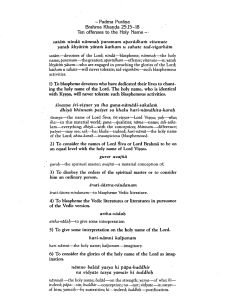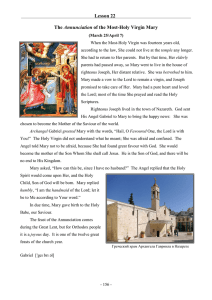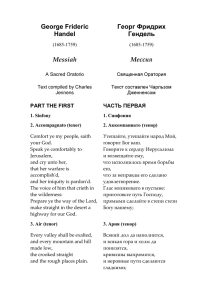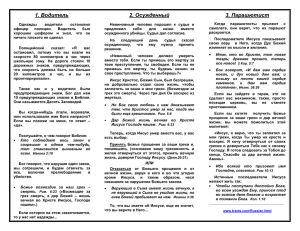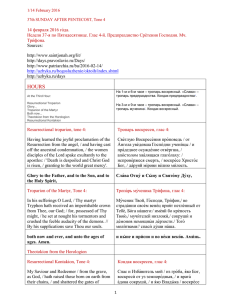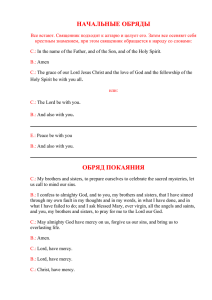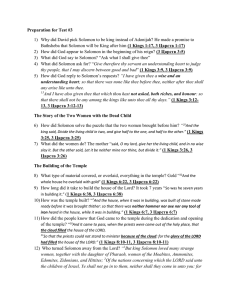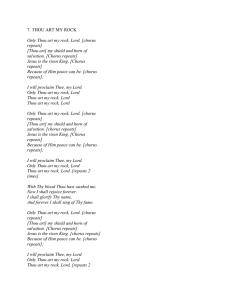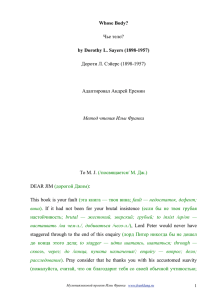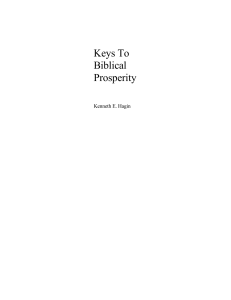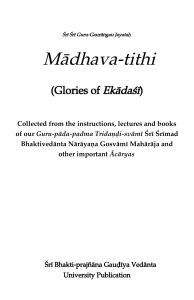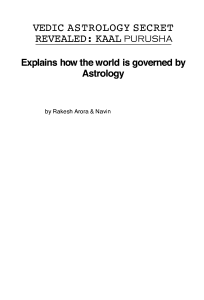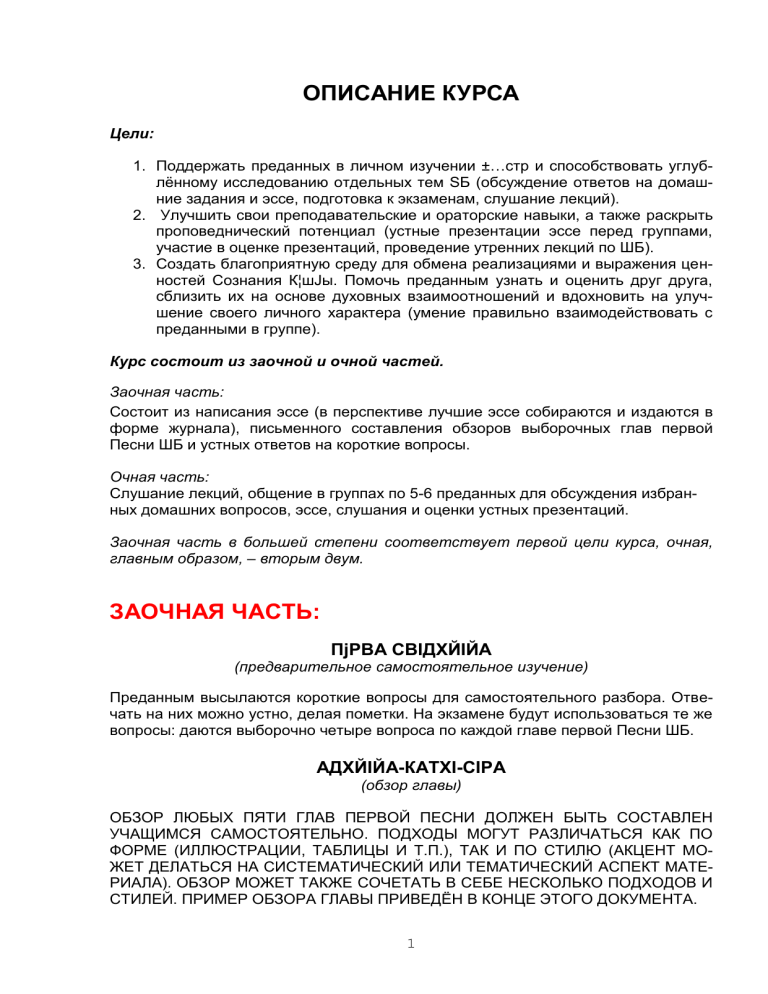
ОПИСАНИЕ КУРСА Цели: 1. Поддержать преданных в личном изучении ±…стр и способствовать углублённому исследованию отдельных тем ЅБ (обсуждение ответов на домашние задания и эссе, подготовка к экзаменам, слушание лекций). 2. Улучшить свои преподавательские и ораторские навыки, а также раскрыть проповеднический потенциал (устные презентации эссе перед группами, участие в оценке презентаций, проведение утренних лекций по ШБ). 3. Создать благоприятную среду для обмена реализациями и выражения ценностей Сознания К¦шЈы. Помочь преданным узнать и оценить друг друга, сблизить их на основе духовных взаимоотношений и вдохновить на улучшение своего личного характера (умение правильно взаимодействовать с преданными в группе). Курс состоит из заочной и очной частей. Заочная часть: Состоит из написания эссе (в перспективе лучшие эссе собираются и издаются в форме журнала), письменного составления обзоров выборочных глав первой Песни ШБ и устных ответов на короткие вопросы. Очная часть: Слушание лекций, общение в группах по 5-6 преданных для обсуждения избранных домашних вопросов, эссе, слушания и оценки устных презентаций. Заочная часть в большей степени соответствует первой цели курса, очная, главным образом, – вторым двум. ЗАОЧНАЯ ЧАСТЬ: ПјРВА СВІДХЙІЙА (предварительное самостоятельное изучение) Преданным высылаются короткие вопросы для самостоятельного разбора. Отвечать на них можно устно, делая пометки. На экзамене будут использоваться те же вопросы: даются выборочно четыре вопроса по каждой главе первой Песни ШБ. АДХЙІЙА-КАТХІ-СІРА (обзор главы) ОБЗОР ЛЮБЫХ ПЯТИ ГЛАВ ПЕРВОЙ ПЕСНИ ДОЛЖЕН БЫТЬ СОСТАВЛЕН УЧАЩИМСЯ САМОСТОЯТЕЛЬНО. ПОДХОДЫ МОГУТ РАЗЛИЧАТЬСЯ КАК ПО ФОРМЕ (ИЛЛЮСТРАЦИИ, ТАБЛИЦЫ И Т.П.), ТАК И ПО СТИЛЮ (АКЦЕНТ МОЖЕТ ДЕЛАТЬСЯ НА СИСТЕМАТИЧЕСКИЙ ИЛИ ТЕМАТИЧЕСКИЙ АСПЕКТ МАТЕРИАЛА). ОБЗОР МОЖЕТ ТАКЖЕ СОЧЕТАТЬ В СЕБЕ НЕСКОЛЬКО ПОДХОДОВ И СТИЛЕЙ. ПРИМЕР ОБЗОРА ГЛАВЫ ПРИВЕДЁН В КОНЦЕ ЭТОГО ДОКУМЕНТА. 1 ПРАВИЛЬНОСТЬ СОСТАВЛЕНИЯ ОБЗОР ГЛАВЫ: А) ОХВАТЫВАЕТ КЛЮЧЕВЫЕ МОМЕНТЫ ГЛАВЫ (ОСНОВНЫХ ТЕКСТОВ И КОММЕНТАРИЕВ). Б) КРАТКОСТЬ (УМЕНИЕ ПО СУЩЕСТВУ И МИНИМАЛЬНЫМ КОЛИЧЕСТВОМ СЛОВ ВЫРАЖАТЬ МЫСЛИ). В) ПОКАЗЫВАЕТ ЛОГИКУ РАЗВИТИЯ ГЛАВЫ (ФИЛОСОФСКАЯ И ТЕМАТИЧЕСКАЯ ЛИНИЯ РАССУЖДЕНИЯ). БЛОКИ ТЕКСТОВ И ПЕРЕХОДЫ МЕЖДУ НИМИ. В) САМОСТОЯТЕЛЬНОСТЬ ИССЛЕДОВАНИЯ (ОРИГИНАЛЬНОСТЬ ПОДХОДА ОСОБЕННО ПООЩРЯЕТСЯ). ОШИБКИ: А) ПОГРУЖЕНИЕ ВО ВТОРОСТЕПЕННЫЕ ДЕТАЛИ. НЕПРАВИЛЬНОЕ ОПРЕДЕЛЕНИЕ КЛЮЧЕВЫХ МОМЕНТОВ ГЛАВЫ. Б) МНОГОСЛОВНОСТЬ. В) ОТСУТСТВИЕ ЛОГИКИ/ЗАКОНЧЕННОСТИ В ПОСТРОЕНИИ ОБЗОРА. ПРЕДАННЫЕ СОСТАВЛЯЮТ ОБЗОР ЛЮБЫХ 5 ГЛАВ НА СВОЁ УСМОТРЕНИЕ. ОБЗОРЫ ГЛАВ И ГОТОВЫЕ ЭССЕ СДАЮТСЯ ДО НАЧАЛА КУРСА (ПОСЫЛАЙТЕ ИХ НА [email protected]) НАПИСАНИЕ ЭССЕ Объём одного эссе – 4-5 страниц формата А-4, размер шрифта 12. Для первой Песни пишутся две курсовые работы (эссе). Эссе пишется с использованием книги ШБ, можно использовать выдержки из лекций Шрилы Прабхупады и другой дополнительный материал. Однако приоритет отдаётся ссылкам на цитаты тех разделов первой Песни ШБ, где максимально затрагивается выбранная вами тема. Цитаты извне ШБ возможны, но не должны составлять более чем 1/3 всех представляемых цитат. ТЕМА: свободная, тем не менее, выбирайте тему без отрыва от основных положений первой Песни. Рекомендация по составлению эссе: определитесь с темой, далее составьте схематично план основных моментов эссе и посмотрите, раскрывают ли они должным образом тему. Подберите цитаты из комментариев и шлоки подтверждающие ваши аргументы. Ещё раз: эссе не должно быть отвлечённым от содержимого первой Песни ШБ. Сконцентрируйтесь на фактическом материале. Структурируйте эссе. Придайте ему законченный вид, отшлифовав плавность переходов от одного пункта обсуждения к другому. Можно обсудить план вашего эссе с вашим слугой – Вишишта дас – буду рад помочь. ([email protected]) Пример эссе приводится в приложениях, в конце данного документа. (ПОКА НЕ ДОСТУПЕН НА РУССКОМ – СКОРО ПЕРЕВЕДУ!) 2 ОЦЕНКА СОДЕРЖАНИЯ ЭССЕ Критерии оценки Неудовлетворительно Удовлетворительно Хорошо Очень хорошо Отлично Знание Понимание Глубина, раскрытие темы Недостающие звенья, нераскрытые положения Рассмотрено несколько философских моментов, но не все положения раскрыты. Рассмотрены все основные философские моменты. Тема раскрыта. Рассмотрены и раскрыты все философские моменты, с разных перспектив. Литературные украшения. Оригинальное исследование. Философское соответствие Тема несущественна. Тема подобрана верно, однако не все положения соответствуют ей или окончательному выводу. Тема важная, рассматриваемые положения согласуются с темой. Злободневная и глубоко раскрытая тема. Использован интересный материал, подчёркивающий актуальность темы. Цитаты Без цитат или их недостаточно для раскрытия темы/ подкрепления вывода. Подходящие, но малочисленные цитаты, неполно отражающие тему. Цитаты, подходящие к теме и выводу. Цитаты подходящие и содержательные. Представлено уникальное понимание известных цитат. Подкреплено интересными ссылками. ОЦЕНКА СТРУКТУРЫ ЭССЕ Структура эссе Неудовлетворительно Удовлетворительно Хорошо Отлично Введение Отсутствует Не захватывает внимания. Правильно построено. Вывод Отсутствует Не полностью соответствует обсуждению. Подводящий итог, соответствует обсуждению. Увлекательно; нет важных упущений; Логичный; законченный, оставляет впечатление. 3 Логика Краткость Отсутствует, либо спекуляции на основе логики без ссылок на Шастры. 3-4 нелогичных, резких переходов. Логические выводы, оставляющие место для спекуляций. 1-2 примера нелогичных высказываний или резких переходов между философскими моментами. Многословно или слишком сжато 3-4 примера 1-2 примера лишней ин- многослоформации вия либо многословия Плавность переходов, недвусмысленность, ясность. Кратко, литературно, убедительно Просьба подавать эссе в электронном виде до начала очной части курса. ОЧНАЯ ЧАСТЬ: Лекции Главный лектор – ЕС Ханумат Прешака Свами. Курс предполагает изучение первой Песни ШБ; также будут проводиться дополнительные обзорные факультативы по книгам Шрилы Рупы Госвами: Нектар Наставлений, Нектар Преданности, Лалита Мадхава и Видагдха Мадхава. Академическая биография Махараджа: Hanumatpresaka Swami (Professor Huber Hutchin Robinson) http://www.jayarama.us/archives/hps-bio-nios.txt Родился 12 января 1948 года, Гуам, Марианские острова Тихого океана. Вырос на юго-западе Соединённых Штатов. В 1970 году получил степень бакалавра искусств в Калифорнийском университете, закончив с отличием психологический факультет. Начал писать докторскую диссертацию по психологии в Северо-западном университете США, но быстро убедился в необходимости развития более широких и глубоких парадигм в психологии. Это привело к участию в одной из лучших импровизационных театральных трупп США, получению чёрного пояса по Ауто-рю, Окинавскому стилю каратэ, и, в конце концов, кульминировало в присоединении к Движению «Харе Кришна». Махарадж с 1974 года выполнял служение в ашраме брахмачари, в 1984 году принял саннйасу, в 1994 году начал принимать учеников. Одновременно продолжал свою академическую карьеру в качестве директора Института Бхактиведанты до настоящего положения в роли внештатного лектора 4 Института изучения Ориенталистических и Западных классических наук Университета Ричарда Палма, Лима, Перу и генерального секретаря Североамериканского Института Ориенталистических и классических наук Тенниса, США. Махарадж ездил с лекциями по всему миру, организовывая программы, в которых участвовали Нобелевские лауреаты, такие как Чарлз Тониз, Сэр Джон Экклис, Далай Лама и другие. Выступал в качестве почётного гостя на «Национальном семинаре науки и технологии Древней Индии», организованном Калькуттским Университетом в 2001 году. В настоящее время продолжает давать лекции и консультации, но акцент сместился на популяризацию Шримад Бхагаватам и вайшнавское образование. NIOS 304 Astor Way Franklin, TN 37064 USA Работа в группах Каждая группа состоит из 5-6 преданных. Её курирует помощник преподавателя. Группа встречается 3 раза в неделю на один час для совместных занятий и обсуждений. Предлагаемый формат встречи группы: 20 минут – совместная проработка устных ответов на домашние задания. 20 минут – слушание презентации эссе. 20 минут – отзывы слушателей на презентацию: позитивные моменты + что можно улучшить. Оценка устных презентаций эссе осуществляется помощником преподавателя. Критерии оценки устных презентаций ОЦЕНКА (0-10) СЛАБО (0-3) УДОВЛЕТВОРИТЕЛЬНО (4-6) ХОРОШО (6-8) Речь в целом и ораторские 5 ОЧЕНЬ ХОРОШО (8-9) Отлично (9-10) способности (умение интересно представить материал, визуальный контакт, дикция, жестикуляция, смелость). Умение расположить к себе аудиторию, личностный подход. Понимание аудитории. Особые навыки (проведение групповых обсуждений). Организованность (рациональное планирование, использование ресурсов, умение распоряжаться временем). Тема презентации (актуальность, глубина раскрытия темы – ЛиП, Н+М) Тема устных групповых презентаций Презентации должны соответствовать теме эссе. Пожалуйста, помните, что ваша презентация не обязательно должна охватывать все пункты вашего эссе (лишь суть), поскольку у вас в распоряжении будет только 20-25 минут. Ключевые стихи для заучивания из Первой песни: 1.1.1, 1.1.10, 1.2.6, 1.2.8, 1.2.11, 1.2.16, 1.2.17, 1.2.18, 1.3.28, 1.3.43, 1.5.11, 1.5.18, 1.7.6, 1.7.10, 1.8.26, 1.8.42, 1.13.10, 1.18.13 (см. стихи в конце) НА ЭКЗАМЕНЕ БУДУТ ЗАДАНЫ ВЫБОРОЧНО 7 ШЛОК: УКАЗЫВАЕТСЯ НОМЕР СТИХА И ПЕРВОЕ САНСКРИТСКОЕ СЛОВО ШЛОКИ. Формальная аттестация 40% - экзамен без использования книг (короткие вопросы и шлоки). 60 % - два эссе и устная презентация одного из них, 6 Посещаемость занятий и полной утренней программы подразумевается. При отсутствии таковой из конечного результата будут вычитаться баллы (до 5%). Будут учитываться также вайшнавские качества и поведение в целом. Оценки Оценка Значение 85+ 75 - 84 65 - 74 55 - 64 50 - 54 45 - 49 - 44 Отлично Очень хорошо Хорошо Удовлетворительно Проходной балл На грани провала Неудовлетворительно ПРИЛОЖЕНИЯ ПРИМЕР СОСТАВЛЕНИЯ ОБЗОРА ОДНОЙ ИЗ ГЛАВ ПЕРВОЙ ПЕСНИ ШБ (взято из старого пособия по изучению ШБ Бхуриджана прабху) ПЕСНЬ ПЕРВАЯ, ГЛАВА ШЕСТАЯ БЕСЕДА НАРАДЫ С ВЙАСАДЕВОЙ 1. Сюжет и подсказка Раздел А: тексты 1-4. Шрила Вйасадева спрашивает Нараду Муни о том, как протекала его жизнь после ухода великих мудрецов. Подсказка к теме раздела: Продвижение в Сознании Кришны. Раздел Б: тексты 5-15. Нарада Муни рассказывает, что после смерти матери от укуса ядовитой змеи он пустился в странствия. Однажды, сидя под деревом баньян, он начал медитировать на Господа, пребывающего в сердце. Подсказка к теме раздела: Процесс духовного совершенствования. Раздел В: тексты 16-20. Во время медитации перед ним впервые явилась Сверхдуша и тут же быстро исчезла. Нарада Муни был сильно опечален. Подсказка к теме раздела: Развитие и ощущение экстатической любви к Богу. Раздел Г: тексты 21-25. Господь заговорил с Нарадой, и Его слова рассеяли печаль Нарады. Подсказка к теме раздела: Обучение в Сознании Кришны. 7 Раздел Д: тексты 26-30. Описав свою встречу со Сверхдушой, Нарада рассказывает Вйасе о том, как он провел остаток своей жизни. Затем он описывает свое следующее рождение в образе великого мудреца Нарады. Подсказка к теме раздела: Жизнь искреннего преданного. Раздел Е: тексты 31-33. Вйасадева слушает о постоянно совершаемой трансцендентной деятельности Нарады Муни. Подсказка к теме раздела: Практикование бхакти путем следования авторитетам. Раздел Ж: тексты 34-38. Нарада завершает свои наставления Вйасадеве, и Сута Госвами повествует об его уходе. Затем Сута Госвами воспевает славу Нараде. Подсказка к теме раздела: Преданное служение. Шлоки для запоминания из Первой песни ШБ 1.1.1 ом намо бхагавате васудевайа джанмадй асйа йато нвайад итараташ чартхешв абхигйах сварат тене брахма хрида йа ади-кавайе мухйанти йат сурайах теджо-вари-мридам йатха винимайо йатра три-сарго мриша дхамна свена сада нираста-кухакам сатйам парам дхимахи О мой Господь Шри Кришна, сын Васудевы, о всепроникающая Личность Бога, я почтительно склоняюсь перед Тобой. Я медитирую на Господа Шри Кришну, ибо Он является Абсолютной Истиной и изначальной причиной всех причин созидания, сохранения и разрушения проявленных вселенных. Прямо и косвенно Он сознает все проявления и независим, ибо не существует иной причины, кроме Него. Именно Он вначале вложил ведическое знание в сердце Брахмаджи, первого живого существа. Даже великие мудрецы и полубоги введены Им в заблуждение, подобно тому, как человека сбивает с толку обманчивый образ воды в огне или суши на воде. Лишь благодаря Ему материальные вселенные, временно проявленные взаимодействием трех гун природы, кажутся истинными, хотя в действительности они нереальны. Поэтому я медитирую на Него, Господа Шри Кришну, вечно пребывающего в трансцендентной обители, которая всегда свободна от иллюзорных образов материального мира. Я медитирую на Него, ибо Он – Абсолютная Истина. 1.1.10 прайеналпайушах сабхйа калав асмин йуге джанах мандах суманда-матайо манда-бхагйа хй упадрутах О мудрец, в этот железный век Кали жизнь людей коротка. Они вздорны, ленивы, введены в заблуждение, неудачливы и к тому же пребывают в постоянной тревоге. 1.2.6 са ваи пумсам паро дхармо 8 йато бхактир адхокшадже ахаитукй апратихата йайатма супрасидати Высшим занятием (дхармой) для всех людей является такое занятие, с помощью которого они могут прийти к любовному преданному служению трансцендентному Господу. Чтобы полностью удовлетворить душу, такое преданное служение должно быть бескорыстным и непрерывным. 1.2.8 дхармах свануштхитах пумсам нотпадайед йади ратим вишваксена-катхасу йах шрама эва хи кевалам Вся деятельность человека, совершаемая им в соответствии с его положением, - бесполезный труд, если она не пробуждает в нем интереса к посланию Личности Бога. 1.2.11 вайам ваданти тат таттва-видас брахмети параматмети таттвам йадж гйанам адбхагаван ити шабдйате Сведущие трансценденталисты, познавшие Абсолютную Истину, называют эту недвойственную субстанцию Брахманом, Параматмой или Бхагаваном. 1.2.16 шушрушох шраддадханасйа сйан махат-севайа випрах васудева-катха-ручих пунйа-тиртха-нишеванат О дваждырожденные мудрецы, служить преданным, полностью свободным от всех пороков, - великое благо. Благодаря этому служению человек обретает склонность слушать послания Васудевы. 1.2.17 шринватам сва-катхах кришнах хридй антах стхо хй абхадрани пунйа-шравана-киртанах видхуноти сухрит сатам Шри Кришна, Личность Бога – Параматма (Сверхдуша) в сердце каждого и благодетель честного преданного – очищает сердце преданного от стремления к материальным наслаждениям, когда в том развивается потребность слушать Его послания, которые добродетельны сами по себе, если их правильно слушают и повторяют. нашта-прайешв абхадрешу нитйам бхагавата-севайа бхагаватй уттама-шлоке бхактир бхавати наиштхиким Благодаря регулярному посещению лекций по «Бхагаватам» и служению чистому преданному все, что вызывает тревогу в сердце, почти полностью уничтожается, и тогда любовное служение Верховному Господу, воспеваемому в трансцендентных песнях, становится необратимым. 1.2.18 1.3.28 эте чамша-калах пумсах кришнас ту бхагаван свайам индрари-вйакулам локам мридайанти йуге йуге 9 Все перечисленные воплощения представляют собой либо полные части, либо части полных частей Господа, однако Господь Шри Кришна – изначальная Личность Бога. Они нисходят на разные планеты, когда там по вине атеистов возникают беспорядки. Господь нисходит, чтобы защитить верующих. кришне сва-дхамопагате дхарма-гйанадибхих саха калау нашта-дришам эша пуранарко дхунодитах Эта «Бхагавата-пурана» сияет, словно солнце. Она взошла сразу же после того, как Господь Кришна, сопровождаемый религией, знанием и проч., удалился в Свою обитель. Эта Пурана принесет свет людям, утратившим способность видеть в непроглядной тьме невежества века Кали. 1.3.43 1.5.11 тад-ваг-висарго джанатагха-виплаво йасмин прати-шлокам абаддхаватй апи наманй анантасйа йашо нкитани йат шринванти гайанти гринанти садхавах Но сочинение, состоящее из описаний трансцендентного величия имени, славы, форм, игр безграничного Верховного Господа, резко отличается от них. Оно составлено из трансцендентных слов, назначение которых – совершить переворот в неправедной жизни сбившейся с пути цивилизации. Такие трансцендентные произведения, даже если они несовершенны по форме, слушают, поют и принимают чистые люди, которые безукоризненно честны. 1.5.18 тасйаива хетох прайатета ковидо на лабхйате йад бхраматам упарй адхах тал лабхйате духкхавад анйатах сукхам калена сарватра габхира-рамхаса Истинно разумные и склонные к философии люди должны стремиться только к достижению той цели, которой нельзя достичь в этой вселенной, даже если обойти всю ее – от высшей планеты (Брахмалоки) до низшей (Паталы). Что же касается счастья, которое приносят чувственные наслаждения, то в положенный срок оно само приходит к нам так же, как в положенный срок к нам вопреки нашей воле приходят непрошенные страдания. 1.7.6 анартхопашамам сакшад локасйаджанато видвамш бхакти-йогам адхокшадже чакре сатвата-самхитам Связующий процесс преданного служения может непосредственно облегчить все материальные страдания живого существа, которые чужды его природе. Но люди в большинстве своем не знают этого. Потому мудрец Вьясадева составил это ведическое писание, которое связано с Высшей Истиной. 1.7.10 сута увача атмарамаш ча мунайо ниргрантха апй урукраме курвантй ахаитуким бхактим иттхам-бхута-гуно харих Все различные атмарамы (те, кто черпает наслаждение в атме, духовном «я»), особенно те из них, кто утвердился на пути самоосознания, желают нести 10 беспримесное преданное служение Личности Бога, несмотря на то, что уже освободились от всех материальных пут. Это означает, что Господь обладает трансцендентными качествами и поэтому привлекает всех, в том числе и освобожденные души. 1.8.26 джанмаишварйа-шрута-шрибхир эдхамана-мадах пуман наивархатй абхидхатум ваи твам акинчана-гочарам О мой Господь, достичь Тебя легко лишь тому, у кого нет ничего материального. Тот же, кто стоит на пути (материального) прогресса, пытаясь улучшить свою жизнь знатным происхождением, огромным богатством, хорошим образованием и телесной красотой, не может искренне обратиться к Тебе. 1.8.42 твайи ме нанйа-вишайа матир мадху-пате сакрит ратим удвахатад аддха гангеваугхам уданвати О Господь Мадху, как Ганга вечно течет к морю, не зная препятствий, так и я хочу постоянно стремиться к Тебе, не отвлекаясь ни на кого другого. 1.13.10 бхавад-видха бхагаватас тиртхи-курванти тиртхани тиртха-бхутах свайам вибхо свантах-стхена гадабхрита О мой господин, воистину такие преданные, как ты – это олицетворенные святые места. Ты несешь в своем сердце Личность Бога и потому превращаешь любое место в место паломничества. 1.18.13 тулайама лавенапи бхагават-санги-сангасйа на сваргам напунар-бхавам мартйанам ким уташишах Ценность одного мгновения, проведенного в общении с преданным Господа, невозможно сравнить даже с достижением райских планет или освобождением от материи, не говоря уже о мирских благословениях в форме материального благополучия, которые предназначены для тех, кому суждено умереть. ПРИМЕР НАПИСАНИЯ ЭССЕ Viçiñöa dasa The Poñaëaà aspect of the Lord in Queen Kunti’s prayers as it is elaborated in Bhaktivedänta’s purports (ÇB 1.8.18-43). What it actually means to surrender to the Lord and to be fully dependent on Him? In the present paper we’ll examine the contents of Queen Kunté’s prayer which answer this important for every devotee question. 11 A prayer is a natural expression of a devotee’s heart in his relationship with the Supreme Lord. This is the one of those important aìgas bhakti which gives us a key to the understanding of proper mood in approaching and serving the Lord. In the Bhakti-rasämåta-sindhu Çréla Rüpa Gosvämé has mentioned three types of prayers: Saàprärthanätmikä vijïapti – prayer with wholehearted submission of mind, body and everything to the Lord; Dainyavodhikä vijïapti – expressing humility and personal insignificance to the Lord and Lälasämayé vijïapti – expressing one’s yearning for perfection in the personal service to the Lord. Prayer of Kunté devé is Saàprärthanätmikä prayer and we’ll analyse it in respect to one of the ten Çrémad Bhägavatam’s topics namely the Poñaëaà or protection of the devotees by the Lord. First of all let us state the reasons by which we decided that Kunté’s prayers are under the Saàprärthanätmikä heading. The example of Saàprärthanätmikä prayer given by Çréla Rüpa Gosvämé from Padma Puräëa is as follow: “My Lord, I know that young girls have natural affection for young boys, and that young boys have natural affection for young girls. I am praying at Your lotus feet that my mind may become attracted unto You in the same spontaneous way.” I found this statement to be very close to the mood of Çrématé Kunté devé she is expressing in her prayers, in the verse: tvayi me ’nanya-viñayä / matir madhu-pate ’sakåt /ratim udvahatäd addhä / gaìgevaugham udanvati – “O Lord of Madhu, as the Ganges forever flows to the sea without hindrance, let my attraction be constantly drawn unto You without being diverted to anyone else.” Saàprärthanätmikä type prayer demonstrate the mood of surrender, exhibiting some of the six elements of Çaraëägati. Çréla Prabhupäda in his book Teaching of Queen Kunté confirms that her prayer indeed demonstrate the mood of complete surrender: “After the Battle of Kurukñetra ended and the Päëòavas were established in their kingdom, Kåñëa, before going back home to Dvärakä, was taking leave of His aunt and bidding her farewell. It was at that time that Kunté offered this prayer. Now she directly asks, “Is it a fact that after finishing Your duty You are going away and leaving us alone?” This is the devotee’ s position. Kuntédevé says, yeñäà na cänyad bhavataù padämbujät: “We have no means of protection other than Your lotus feet.” This is full surrender. In the process of surrender (çaraëägati) there are six items. The first is that one should completely depend on Kåñëa, and the next is that one should accept everything favorable for Kåñëa’s service (änukülyasya saìkalpaù)…” How does Çrématé Kunté devé exhibits all the six items of Çaraëagati in her prayers? 1. She accept calamities as favourable to her devotional service (ÇB 1.8.25) 2. She discards material opulences (janma, aiñvarya, çruta and çré) which obstruct approaching the Lord “with sincere feeling” (ÇB 1.8.26). 3. She considers Kåñëa to be her only protector (and that is the main subject of our essay) – “O Håñékeça, master of the senses and Lord of lords, You have released Your mother, Devaké, who was long imprisoned and distressed by the envious King Kaàsa, and me and my children from a series of constant dangers.” (ÇB 1.8.23) 4. She is thinking of Him as the only maintainer: “All these cities and villages are flourishing in all respects because the herbs and grains are in abundance, the trees are full of fruits, the rivers are flowing, the hills are full of minerals and the oceans full of wealth. And this is all due to Your glancing over them.” (ÇB 1.8.40) 5. She remains always humble and meek – “How, then, can we women know You perfectly?” (ÇB 1.8.20). 12 After analysing the contents of Kunté’s prayers I noted for myself the following topics discussed there: 1. Knowledge of the greatness of the Lord; 2. The beauty of Kåñëa’s form; 3. Lord Kåñëa’s activities of protection of His parents, Kunti’s sons and other devotees; 4. The purposes of His appearance and 5. The inconceivable nature of His pastimes. However, the obvious predominance of the element Çaraëägati – avaçya rakñibe kåñëa’—viçväsa pälana – accepting Kåñëa as the only protector, over other topics can not be denied. Indeed this whole chapter as well as the previous and consequent ones are demonstrating the unique relationship between the Lord and His devotees where Kåñëa plays the role of the Supreme Protector and the devotee exhibits the mood of surrender. The examples of Arjuna with his brothers, Uttara, Yudhiñöhira and Kunté devé are all teaching us one lesson: The surrendered soul must accept the fact that his real protector is Kåñëa, not his material acquisitions. This protection of devotees or Poñaëam aspect of the Lord can be observed throughout the whole Çrémad Bhägavatam and it is said in the Second Canto that the purpose of the descriptions of the nine preliminary subjects such as Sarga, Visarga, Poñaëam etc. is to give us a clear understanding and appreciation of the tenth subject (daçamasya viçuddhy-arthaà), the advayajïäna, which is also called the äçraya. And that is Çré Kåñëa– the fountainhead of everything. In our present conditioned state we have no experience of His personal features, and so if we hear these described without proper commentary we may misconstrue them owing to our strong material conditioning. In fact we can more easily understand the Lord’s marginal characteristics manifested within the material nature, for they are within the scope our of our personal experience. Naturally because every conditioned soul is constantly overwhelmed with all kinds of fears and sufferings in this material world the Poñaëam aspect of the Lord whom the fear personified is afraid is very attractive for all. Who would feel himself unhappy knowing that he is protected by the All Powerful Personality? – “Having unflinching faith in the Supreme Lord as one’s protector, friend and master is the natural condition of eternal life. A living entity is so made by the will of the Almighty that he is most happy when placing himself in a condition of absolute dependence.” (ÇB 1.9.22) Kunté devé had just witnessed how the Lord at the same time protected externally her sons and internally He entered the womb of Uttara to protect Parikñit. Kåñëa’s protection is always timely and infallible – rakhe kåñëa mareke mare kåñëa rakheke – if Kåñëa wants to protect someone then nobody can make any harm to that person and if Kåñëa wants to kill someone then nobody can protect him. Personally I think that if I wouldn’t be assured in complete protection by the Lord (kaunteya pratijänéhi na me bhaktaù praëaçyati) it would be very difficult for me to remain in Kåñëa Consciousness movement for a long period of time. I was prone to overestimate my motives in joining the spiritual society thinking that I had joined because of the desire to realize the AT. However after almost 12 years of devotional practice I feel that now my main motivators that give me the most of enthusiasm in my spiritual life are all sorts of calamities, sufferings and obstacles on the devotional path which can really be mitigated and removed only by the Lord Himself. Kunté devé request Kåñëa to protect her from family, from attachments to the family members and rial existence. However protection doesn’t means the material body. Superficially someone may think 13 the enemies of her from pains of matejust protection of that Kunté devé was very much afraid of the enemies and therefore only because of that she is requesting Kåñëa not to leave them. But after analyzing the progression of the prayer we can see that she is actually afraid of forgetfulness of her Lord and not at all of the calamities which she welcomes. And even further we can say that she is not so much afraid of forgetfulness of Kåñëa who is her life and soul but actually she is afraid of separation from Kåñëa and her request is to actually protect her from the pain of separation from the Lord. This is the confidential reason of her prayer though all other points in the prayer are also valid and may be useful and encouraging for the devotees situated on the different spiritual levels. This pain of separation is also expressed in Gopé Géta where gopis in a similar way request Kåñëa to protect them from it: “It is only for Your sake that we, Your devoted servants, maintain our lives. We have been searching everywhere for You, so please show Yourself to us. O bestower of benedictions, You are killing the maidservants who have given themselves to You freely, without any price. Isn’t this murder?” In the case of such exalted devotees as Kunté devé, or Gopis, or Bhiñma, or even in the case of the sincere beginner in devotional service all the trials including the separation from Kåñëa are meant for increasing the attachment of the devotees to the Lord and they are actually arranged by His sweet will. Çréla Prabhupäda says in his purport to ÇB 1.9.19: “Tribulations imposed upon the devotees by the Lord constitute another exchange of transcendental bhäva between the Lord and the devotees. The Lord says “I put My devotee into difficulty, and thus the devotee becomes more purified in exchanging transcendental bhäva with Me.” Placing the devotee into material troubles necessitates delivering him from the illusory material relations. The material relations are based on reciprocation of material enjoyment, which depends mainly on material resources. Therefore, when material resources are withdrawn by the Lord, the devotee is cent percent attracted toward the transcendental loving service of the Lord. Thus the Lord snatches the fallen soul from the mire of material existence. Tribulations offered by the Lord to His devotee are different from the tribulations resulting from vicious action. All these glories of the Lord are especially known to the great mahäjanas like Brahmä, Çiva, Närada, Kapila, Kumära and Bhéñma, as mentioned above, and one is able to grasp it by their grace.” In this way we see that the trials as well as the protection is given by the Lord out of His mercy to the devotee. But positivism in accepting the fact that our sufferings are send by the Lord and the hope that the Lord will surely protect us require some qualification. Sréla Prabhupäda states that the main qualification for that is the devotional pious activities (bhakti unukhi sukåti) performed by the person in his past life: “Generally the distressed, the needy, the intelligent and the inquisitive, who have performed some pious activities, worship or begin to worship the Lord. Others, who are thriving on misdeeds only, regardless of status, cannot approach the Supreme due to being misled by the illusory energy. Therefore, for a pious person, if there is some calamity there is no other alternative than to take shelter of the lotus feet of the Lord.” (ÇB 1.8.25) And as opposed to that qualification for accepting everything as the Lord’s mercy ÇP describes the disqualification for getting the Lord’s protection: “This is partially due to their poor fund of knowledge and partially due to their stubborn obstinacy, which results from various misdeeds in the past and present. Such persons could not recognize Lord Çré Kåñëa even when He was present before them. Another difficulty is that those who depend more on their imper- 14 fect senses cannot realize Him as the Supreme Lord.” (ÇB 1.8.19) Such an impious people will exclusively rely upon their material acquisitions such as birth in a high family, wealth, education, beauty or some powerful personalities of this world which are actually all different manifestation of çakti of the Lord but they don’t see the connection of this çaktis with the Çaktimän. Like Duryodhana when asked what he’d like to have on his side in the battle – Kåñëa or His armies he immediately choosed Kåñëa’s armies. Such impious persons are unable to acknowledge the necessity of dependence on the Supreme Lord: “In the material world, to be dependent on the mercy of someone else is the utmost sign of misfortune…” (ÇB 1.8.37) But the chaste devotee such as Arjuna (in the same episode) or Kunté devé has no other shelter except the Çaktimän or possessor of all energies, the Supreme Lord: “That is the transcendental nature of the Lord. He reciprocates the dependence of the devotee. One should not, therefore, look for help from imperfect living beings or demigods, but one should look for all help from Lord Kåñëa, who is competent to save His devotees. Such a chaste devotee also never asks the Lord for help, but the Lord, out of His own accord, is always anxious to render it.”(ÇB 1.8.18) As we know Kåñëa reciprocates with everybody according to their attitude. For His devotee’s protection the Lord is prepared to even brake His own promise because He is known as Bhakta-vatsala which means that He is partial to His devotees. Yet this partiality is not the fault of Kåñëa. ÇP says in the purport to the 1.8.29: “Those who are completely against the service of the Lord are considered to be in abject darkness, those who ask for the Lord’s favor only at the time of necessity are partial recipients of the mercy of the Lord, and those who are cent percent engaged in the service of the Lord are full recipients of the mercy of the Lord. Such partiality in receiving the Lord’s mercy is relative to the recipient, and it is not due to the partiality of the all-merciful Lord.” Still there are even different grades of partiality of the Lord to His devotees. He is more prone to help those bhaktas who are situated in a more difficult situation: “Devaké, the mother of Kåñëa and sister of King Kaàsa, was put into prison along with her husband, Vasudeva, because the envious King was afraid of being killed by Devaké’s eighth son (Kåñëa). He killed all the sons of Devaké who were born before Kåñëa, but Kåñëa escaped the danger of child-slaughter because He was transferred to the house of Nanda Mahäräja, Lord Kåñëa’s foster father. Kuntédevé, along with her children, was also saved from a series of dangers. But Kuntédevé was shown far more favor because Lord Kåñëa did not save the other children of Devaké, whereas He saved the children of Kuntédevé. This was done because Devaké’s husband, Vasudeva, was living, whereas Kuntédevé was a widow, and there was none to help her except Kåñëa. The conclusion is that Kåñëa endows more favor to a devotee who is in greater dangers.” (ÇB 1.8.23) When devotee takes risk for the sake of Lord Kåñëa feels very much obliged to such a devotee. In BG Kåñëa Himself declared that He considers as His most dear bhakta the one who preaches His glories to His devotees. Such a preacher certainly takes all kinds of risks for the transcendental pleasure of the Lord. Who then can be more dear to the Lord than such a pure devotee? And of course the best example of such a devotee is Çréla Prabhupäda who risked immensely by leaving Vraja dhäma at a very old age having full faith in Kåñëa’s protection. Çréla Prabhupäda prayed to Kåñëa for protection in a very similar to Queen Kunté’s way when he was struggling alone for almost one year in the country of mlecchas among lowest people 15 of Kali-yuga. As we know Çréla Prabhupäda gave series lectures on the whole prayers on two occasions – in Los Angeles and in Mäyäpur and that shows his appreciation and affinity to the mood expressed by Kunté devé. Here is a small fragment from ÇP’s prayer which was composed by him when he was preparing for his unexampled trip to the West and which I find very similar to Çrématé Kunté’s two statements: “My Lord, Your Lordship can easily be approached, but only by those who are materially exhausted. One who is on the path of [material] progress, trying to improve himself with respectable parentage, great opulence, high education and bodily beauty, cannot approach You with sincere feeling. My obeisances are unto You, who are the property of the materially impoverished. You have nothing to do with the actions and reactions of the material modes of nature. You are selfsatisfied, and therefore You are the most gentle and are master of the monists. (please see ÇB 1.8.26-27) And: O Lord of the universe, soul of the universe, O personality of the form of the universe, please, therefore, sever my tie of affection for my kinsmen, the Päëòavas and the Våñëis. (ÇB 1.8.41): I am sitting alone in Våndävana-dhäma. In this mood I am getting many realizations. I have my wife, sons, daughters, grandsons, everything, But I have no money, so they are a fruitless glory. Kåñëa has shown me the naked form of material nature; By His strength it has all become tasteless to me today. Yasyäham anugåhëämi hariñye tad-dhanaà çanaiù: “I gradually take away all the wealth of those upon whom I am merciful." How was I able to understand this mercy of the allmerciful? Everyone has abandoned me, seeing me penniless— Wife, relatives, friends, brothers, everyone. This is misery, but it gives me a laugh. I sit alone and laugh. In this mäyä-saàsära, whom do I really love? Where have my loving father and mother gone now? And where are all my elders, who were my own folk? Who will give me news of them, tell me who? All that is left of this family life is a list of names. As the froth on the seawater mixes again in the sea, Mäyä-saàsära's play is just like that. No one is mother or father, or personal relative; Just like the sea foam, they remain but a short time. Just as the froth on seawater mixes again in the sea, The body made of five elements meets with destruction. How many bodies does the embodied soul take in this way? His relatives are all related merely to the temporal body. Personally I’m relishing this verses again and again whenever I face some difficult situation. Çréla Prabhupäda, Kunté devotees set for us the ence upon Kåñëa’s mercy and prayers composed by devé, Bhiñma, Arjuna and other great example of highest standard of dependwhich must be learned from their lives them, and which ultimately should be ap16 plied to one’s devotional life. In this way we had briefly described the complete dependence of the devotees on Kåñëa which form a very important limb of Çaraëagati namely: considering the Lord as the only protector and which is essential for any devotional practice on any level of advancement of a devotee. Also we’ve discussed the reciprocation of the Lord to His devotees (Poñaëam aspect) which is one of His opulences and which is extremely attractive and stimulating for both practicing and perfect devotees. ONE MORE SAMPE ESSAY How the first canto of the Çrémad Bhägavatam is helping me to see the affectionate Lord or bhakta-vatsala. By Madhupuri das for Bhaktivaibhava course 1st canto. Introduction When I came to the Krishna consciousness movement I had accepted that the Lord is guiding me, if I so wanted, but I did not understand that the Lord is something more then an inner guide and well-wisher. I had no conception that He has a specific form etc. When I saw the pictures of the spiritual world on the walls of the temple where I joined ISKCON, I was almost scared, and I turned my attention to the friendly devotees instead. Also when I read the Bhagavad-gétä on my own, I speculated that the person speaking the gétä is my very self, non-different from me. This non-devotional understanding of the Absolute did not give any pleasure though, and I was instead more attracted to hear the explanations of the devotees. When I now 17 years later study the first canto and the exchange between Süta Gosvämé and the sages of Naimiñäraëya I understand that these sages have a different background1 then I have, who have grown up in an atheistic and selfish culture. But there seems to be some similarity between us. Many of these sages are very attracted to hear Mahabharat and they readily accept the Supreme Lord in the heart, but they also need to be trained just like myself in understanding the Bhagavän feature of the Lord.2 So when reading the first canto I thought it was a good idea to sit down next to them3 and try to learn the Bhägavatam the same Çréla Prabhupäda writes about the sages in SB 1.1.4p. “They are sincere friends to all living entities, and at the risk of great personal inconvenience they are always engaged in the service of the Lord for the good of all people.” 2 “O Süta Gosvämé, we are eager to learn about the Personality of Godhead and His incarnations. Please explain to us those teachings imparted by previous masters [äcäryas], for one is uplifted both by speaking them and by hearing them.” SB 1.1.13 3 ” Those who listen to the Bhägavatam may put questions to the speaker in or1 17 way they were introduced to it by Süta Gosvämé.4 Specifically I have taken help from Queen Kunté’s prayers, because here we find a very practical lesson in the difference between the Absolute Truth’s Bhagavän and Paramätmä features.5 The initial confusion Just as when I joined the Krishna consciousness movement I didn’t have any clear conception of the three features of the Absolute Truth, also the sages and Queen Kunté seem to exhibit some confusion in relation to who Krishna is, when they are confronted with His Paramätmä feature. Our Süta relates in chapter seven and eight how the Lord has to come to the rescue of the Pandavas and their descendent in mother Uttara’s womb. In SB 1.8.14 Süta says: The Lord of supreme mysticism, Çré Kåñëa, resides within everyone's heart as the Paramätmä. As such, just to protect the progeny of the Kuru dynasty, He covered the embryo of Uttarä by His personal energy. Both Queen Kunté and the sages seem to be confused by this. She is seeing it all herself and the sages who are in rapt attention together with Süta “see” it in their mind. Who is this Krishna? Is He the Paramätmä residing in our hearts? I understand there is a difference between Kunté and the sages; they come from different backgrounds. Çrématé Kuntédevé is very attached to Krishna as bhakta-vatsala6 and does not want Him to leave.7 Here she is confronted with an occasion of a temporary display of His mystic opulence (and that is also one ingredient in her prayers later to Çré Kåñëa). By gradually accepting His Godhood during the course of her prayers, she is able to give up her material, familial attachment for her relatives and instead desire to only be attracted to the Lord.8 The sages on the other der to elicit the clear meaning, but this should not be done in a challenging spirit. One must submit questions with a great regard for the speaker and the subject matter.” (SB 1.1.5p) 4 “Under the direction of a bona fide spiritual master, one becomes gradually purified. Therefore, one must be in the chain of disciplic succession and learn the spiritual art of submissive hearing.” (SB 1.1.13p) 5 “The Lord is, so to speak, a puzzle for the common man. Queen Kunté experienced personally that Lord Kåñëa was present before her, yet He entered within the womb of Uttarä to save her embryo from the attack of Açvatthämä's brahmästra. Kunté herself was puzzled about whether Çré Kåñëa is allpervasive or localized.” (SB1.8.18p) 6 “...bhakta-vatsala, or the lover of His devotee...” (SB 1.8.13p) 7 “Queen Kunté specifically adores the incarnation or descent of Lord Kåñëa above all other incarnations because in this particular incarnation He is more approachable.” (SB 1.8.21p) “...separation from the Lord was just like the separation of a fish from water. Çrématé Kuntédevé, therefore, felt such separation like a thunderbolt, and the whole prayer of the Queen is to try to persuade the Lord to stay with them.” (SB 1.8.37) 8 ” ...Arjuna became a different person by devotional service. ...the prayers of Kunté also indicate the same categorical changes in activities. Çrématé Kunté wanted to serve the Lord without diversion, and that was her prayer. This unalloyed devotion is the ultimate goal of life. Our attention is usually diverted to the service of something which is nongodly or not in the program of the Lord. When the program is changed into the service of the Lord, 18 hand seem to have forgotten about Krishna as bhakta-vatsala and instead they have become enamored by the mysterious Lord. Süta had to interrupt his account and correct them as their teacher: O brähmaëas, do not think this to be especially wonderful in the activities of the mysterious and infallible Personality of Godhead. By His own transcendental energy, He maintains and annihilates all material things, although He Himself is unborn. (SB 1.8.16) And already in the purport to text 13 Çréla Prabhupäda is giving us a hint that bhakta-vatsala is what we as readers of this pastime should be looking for (and not Krishna’s mystic opulence): He is better known as the bhakta-vatsala, or the lover of His devotee, and thus He preferred to continue as bhakta-vatsala than to be a worldly moralist who never breaks his solemn vow. So Çréla Prabhupäda is directing our attention to the Lord’s Bhagavän feature as he is always doing so nicely in his books and lectures.9 So Süta’s correction of the sages in text 16 does not come as a surprise to us, but the sages may very well be in a state of confusion “what does Süta mean? Why should we not consider this as wonderful? Should we neglect the Supreme Lord’s manifestation when he mysteriously saves His relatives and devotees?” Queen Kunté’s superior position Just as the devotees and my param-guru Çréla Prabhupäda were superior to me, when I joined ISKCON, because of their attraction and love for the Lord in His Bhagavän feature, Queen Kunté is in a superior position to the students of Süta because of her attachment to Krishna Himself. Therefore she will be the teacher of the sages. But she is still expressing confusion in her prayers. The sages will hear in Çrématé Kuntédevé’s prayers this confusion and how she is resolving it herself.10 This is a very interesting way of teaching. Ofcourse it is Süta who is taking this opportunity to recite her beautiful prayers and at the same time educate the sages. Often we see that devotees who have a certain level of realization train successfully those devotees who are just about to realize that level. This is standard vedic practice. But the uniqueness of this occasion, and maybe also why it is so attractive to the sages, is that Kunté is completely attached to Krishna and at the same time confused about who He is, just as they are confused. Externally she is just resolving this confusion about Krishna, but actually she is giving her association to the sages so that they also may become genuinely attracted to Krishna and cut their attachment for jïäna and kar...it is called pure unalloyed devotional service. Çrématé Kuntédevé wanted that perfection and prayed for it from the Lord. (SB1.8.42) 9 “...Bhagavän, or the Personality of Godhead, is the last word of the Absolute Truth.” (SB1.2.11p) 10 In text 19 Kuntédevé is already stating the crux of the problem: “Being beyond the range of limited sense perception, You are the eternally irreproachable factor covered by the curtain of deluding energy. You are invisible to the foolish observer, exactly as an actor dressed as a player is not recognized.” I understand the problem to be twofold: The conditioned soul has limited sense perception and the Lord is irreproachable. In this essay I deal mainly with second part and how by purification the jévä can begin to perceive the affectionate Lord. 19 ma covering their eventual devotion for Krishna11. This is the fruit of associating with a superior devotee like Çrématé Kuntédevé.12 The greed to hear and associate with the Bhägavatam In order to exemplify both the sages development and my own purification while hearing the Bhägavatam I have selected four verses from Kuntédevés prayers: manye tväà kälam éçänam anädi-nidhanaà vibhum samaà carantaà sarvatra bhütänäà yan mithaù kaliù na veda kaçcid bhagavaàç cikérñitaà tavehamänasya nåëäà viòambanam na yasya kaçcid dayito 'sti karhicid dveñyaç ca yasmin viñamä matir nåëäm janma karma ca viçvätmann ajasyäkartur ätmanaù tiryaì-nèñiñu yädaùsu tad atyanta-viòambanam gopy ädade tvayi kåtägasi däma tävad yä te daçäçru-kaliläïjana-sambhramäkñam vaktraà ninéya bhaya-bhävanayä sthitasya sä mäà vimohayati bhér api yad bibheti (SB 1.8.28-31) In these few verses Kunté is giving me and the sages a key to enter into the Bhägavatam. In text 28 she address the Lord as Paramätmä among other names like Kälam and Éçänam; it is all secondary names of the Lord. Gradually she elevates her address to “Yaçodänandana with perturbed eyes overflooded with tears” in text 31. In text 28 and 29 she is highlighting a common misunderstanding; that the Lord is partial. This is the first obstacle. If the Lord would only be Kälam or only Yaçodänandana there would hardly be any problem. But when one thinks that Krishna is a supreme and also sweet boy then the envy towards the Lord manifests in wrongly considering Him to be partial. This partiality in the Lord is not very attractive to the conditioned soul. But Kunté says “People only imagine that You are partial.” Why do they do that? Because the rebellious soul would himself be partial if he would be “God” trying to enjoy his friend and relatives. And because of this imagination they cannot see bhakta-vatsala. FortuThat is called Kåñëa consciousness. It is the duty of the äcärya, the spiritual master, to find the ways and means for his disciple to fix his mind on Kåñëa. That is the beginning of sädhana-bhakti. (NOD ch. 2) 12 She is not only resolving the identity of who Krishna is, but she is also incidentally expressing her expected separation from Krishna. This is most effective in displaying her love for Krishna and attract the attention of the sages, and thereby to influence the sages with the same love. This is my understanding of Süta Gosvami’s perspective as teacher. Of course Kunté has her own reasons why she offers her prayers. 11 20 nately for us Çréla Prabhupäda has already informed us earlier that the Lord is bhakta-vatsala (purport 13) and Kunté is doing the same at least in text 31 in relation to Yaçodänandana: This exchange of love between the mother and the son was performed in a natural way, and Kunté, remembering the scene, was bewildered, and she could do nothing but praise the transcendental filial love. (SB1.8.31p) When I was reading these prayers of Kunté I was taking very detailed notes and understanding things in a careful way. But still when I came to Kuntés description of Yaçodä wanting to bind Krishna I was struck by following statement by Prabhupäda (and I could not honestly continue to read): Here is a specific example of the Lord's being the Supreme and at the same time a plaything in the presence of His pure devotee. (SB 1.8.31p) I didn’t enjoy reading this. I wrote “envy” in my journal indicating my own state of mind. I didn’t see bhakta-vatsala anylonger. Süta’s words “don’t consider it very wonderful,”13 came for my help. In other words: forget the Lord’s supreme position for a moment. Why should I do that? Because people become envious of someone who is in a little supreme position. But, I reasoned, that seems dangerous; to forget the Supreme Personality of Godhead! I turned to Prabhupäda’s purport again: The Lord's pure devotee renders service unto the Lord out of unalloyed love only, and while discharging such devotional service the pure devotee forgets the position of the Supreme Lord. (the very next sentence in SB 1.8.31p; my italics) Here in this next sentence of the purport I find the answer not only to one, but to two questions14 and a concomitant loving sentiment for Çréla Prabhupäda manifests in my heart.15 Prabhupäda is explaining why the Lord is “partial”. He is simply reciprocating with the devotee’s unalloyed love. The devotee is not making business with the Lord. Consequently I also understand mother Yaçodä. Prabhupäda secondly states that the devotee should forget the supreme position of the Lord, confirming my own understanding of why Süta was making this statement (in text 16) to the sages; “O brähmaëas, do not think this to be especially wonderful...” After this first reading of “Here is a specific example of the Lord’s being the Supreme...” in purport 31, I understand that purification of my heart is going on. Therefore in trying to be a sincere student I read the sentence again before continuing my reading of the purport. Now my interest is refreshed and another question manifest. How can He practically be both supreme and a plaything at the same time? This is bewildering to me just as it was to Kuntédevé. Then to my help came my Bhaktivaibhava teacher’s statement: “Krishna was not playing or pretending to be fearful.” In other words Krishna is not making business just SB 1.8.16 The two questions are: Is the Lord partial? How should I remember the Lord (or what should I forget)? 15 I realized that my envy was also directed to His Divine Grace; how lucky I was that I didn’t just continue reading! Then instead I realized Çréla Prabhupäda as my well wisher. 13 14 21 pretending to be afraid so that he can enjoy Yaçodä. So Krishna is not supreme in the sense that he is in control of the situation rather the opposite: ... mother Yaçodä is praised for her unique position of love, for she could control even the all-powerful Lord as her beloved child. (SB 1.8.31p) He is simple the supremely beloved among His dear devotees. Finally the simple truth appears to me: Krishna and Yaçodä loves each other, but now Krishna is afraid. In this way I continue my reading of the Bhägavatam and I realize more and more how Çréla Prabhupäda is there to help me in different ways. I can understand that he has not written his purports in a haphazard way, but very scientifically to guide the conditioned soul to liberation and love of Godhead. Therefore I become very careful to read with full attention and very sincere not to miss any possibility for purification. Conclusion In this essay I want to show the importance of reading the first canto very carefully, eagerly and with full attention not only to the words on the paper but also to the heart. The study or worship of the Bhägavatam is not on the level of vaidhi-bhakti but is definitely going in the direction of spontanous loving service: The Supreme Lord also accepts the loving service of His devotees more relishably when the service is rendered spontaneously out of pure affection, without anything of reverential admiration. (SB 1.8.31p) But we should not imitate these pure devotees like mother Yaçodä without the guidance of our spiritual masters (in this case Çrématé Kuntédevé, Süta Gosvämé, and Çréla Prabhupäda): This exchange of love between the mother and the son was performed in a natural way, and Kunté, remembering the scene, was bewildered, and she could do nothing but praise the transcendental filial love. (SB 1.8.31p) So on the level of the first canto we can meet bhakta-vatsala holding the hand of these our guides, but we have to remember that this is just to give us a glimpse into the supremely sweet pastimes of the Lord. As the reader of this essay clearly can see I have to purify my heart by continues hearing of the Bhägavatam16 to be able to enter the pastimes of the Lord in the tenth canto while forgetting His position as the Supreme Lord. Generally the Lord is worshiped by the devotees in a reverential attitude, but the Lord is meticulously pleased when the devotee, out of pure affection and love, considers the Lord to be less important than himself. The Lord's pastimes in the original abode of Goloka Våndävana are exchanged in that spirit. (SB 1.8.31p) “By regular attendance in classes on the Bhägavatam and by rendering of service to the pure devotee, all that is troublesome to the heart is almost completely destroyed, and loving service unto the Personality of Godhead, who is praised with transcendental songs, is established as an irrevocable fact.” (SB 1.2.18) 16 22
